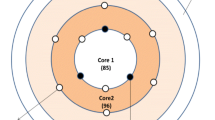Abstract
In the case of failure of cooling systems or structures in spent fuel pools (SFP), the decay heat removal must be guaranteed to prevent a fission product release. The heat, generated by the fuel assemblies (FA), causes a water level decrease, when heat removal systems fail. In this case, the cooling of the inventory is no longer guaranteed. If limit temperatures are exceeded, an irreversible damaging of the fuel assemblies is possible. To predict the decay heat removal for different accident scenarios, the project SINABEL was initiated.
Within this project, the test facility ALADIN was erected in 2016 at TU Dresden to analyze cladding temperature profiles in beyond design accident scenarios. An additional overflow channel was equipped to the ALADIN test facility in order to investigate the influence of air cross overflow on the decay heat removal for different rod powers and overflow velocities in SFP boil-off and air cooling scenarios. To provide an overview of the application field of the test facility, all planned experiments are briefly presented. The results of the first experiments indicate an influence of the overflow on the surface temperatures of the FAs. Finally, conclusions for the safety of SFPs a re drawn.
Similar content being viewed by others
Change history
05 February 2022
A Correction to this paper has been published: https://doi.org/10.1007/s42757-022-0132-z
References
Albring, W. 1978. Angewandte Strömungslehre 5. durchgesehene Auflage. Akademie Verlag Berlin.
Benjamin, A., McCloskey, D., Powers, D., Dupree, S. 1979. Spent fuel heatup following loss of water during storage. Technical Report. Sandia Laboratories, Albuquerque, USA.
Collins, E., Hubbard, G. 2001. Technical study of spent fuel pool accident risk at decommissioning nuclear power plants, NUREG-1738. Washington: US Nuclear Regulatory Comision.
DIN. 2014. DIN 25463 Berechnung der Zerfallsleistung der Kernbrennstoffe von Leichtwasserreaktoren.
Idelchick, I. E. 2005. Handbook of Hydraulic Resistance, 3rd edn. Jaico Publishing House.
KTA. 2015. KTA 3033 Wärmeabfuhrsysteme für Brennelementlagerbecken von Kernkraftwerken mit Leichtwasserraektoren.
Nuclear Engineering International. 2016. Westinghouse boiling point. Available at https://doi.org/www.neimagazine.com/features/featureboilpoint-5010744/.
Oertel, R., Hanisch, T., Krepper, E., Lucas, D., Rüdiger, F., Fröhlich, J. 2019. Two-scale CFD analysis of a spent fuel pool involving partially uncovered fuel storage racks. Nucl Eng Des, 341: 432–450.
Partmann, C. 2019. Experimentelle und theoretische Untersuchungen zur Nachwärmeabfuhr von abgebrannten Brennelementen in Nasslagern bei auslegungsüberschreitenden Störfällen. Dissertation. Technische Universität Dresden.
Partmann, C., Schuster, C., Hurtado, A. 2018. Experimental investigation of the thermal hydraulics of a spent fuel pool under loss of active heat removal conditions. Nucl Eng Des, 330: 480–487.
Schulz, S. 2015. Experimentelle und theoretische Untersuchungen zur Sicherheit von Brennelementlagerbecken von Siedewasserreaktoranlagen. Dissertation. Technische Universität Dresden.
Acknowledgements
This work is part of the research project “SINABEL” and is funded by the German Federal Ministry of Education and Research (BMBF) under the contract number 02NUK027A.
Author information
Authors and Affiliations
Corresponding author
Rights and permissions
About this article
Cite this article
Zedler, P., Schuster, C., Lippmann, W. et al. Experimental study of the influence of cross-overflow on the decay heat removal from spent fuel pools. Exp. Comput. Multiph. Flow 2, 13–21 (2020). https://doi.org/10.1007/s42757-019-0034-x
Received:
Revised:
Accepted:
Published:
Issue Date:
DOI: https://doi.org/10.1007/s42757-019-0034-x



